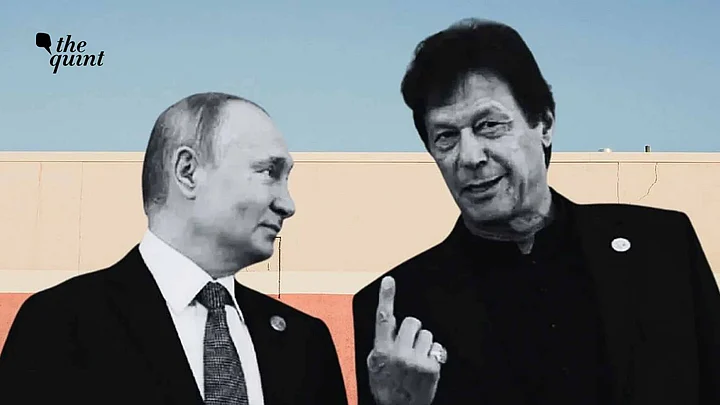Pakistan Prime Minister Imran Khan’s one-day visit to Russia on 23-24 February has confounded almost all. For weeks, it has been known there was imminent danger of Russia invading Ukraine. At a time like this, no West-allied leader would undertake to visit Russia and President Vladimir Putin – not even a desperado like Pakistan’s Imran Khan. But as luck would have it, he was lunching with Putin on the day he launched an air, sea, and land invasion of Ukraine. As western governments rushed to impose further sanctions on Russia, the visit in the middle of all this could not be a bigger disaster, making for terrible optics.
What this visit is set to determine is not the future course of Pakistan-Russia relations – for good reasons to be discussed further down – but Imran Khan’s personal political fortunes at home. As it is, his government was besieged by plans for a no-confidence motion against him, with the powerful military being said to have had enough of its installed puppet, his incompetence, intransigence, and corruption scandals surrounding his government. His government became internationally isolated within a couple of years of coming into power, with freezing winds blowing from the direction of traditional allies like Saudi Arabia, the UAE, the US, and China.
Akin to a Death Wish
The International Monetary Fund (IMF) programme has been suspended for a year, and the Financial Action Task Force (FATF) has not yet moved Pakistan out of the grey list into the white. India and Modi have repeatedly added insult to injury by not responding to Pakistan’s pleas for a thaw in diplomatic relations, though it has carried on back-channel talks between intelligence agencies of the two countries, which resulted in a ceasefire at the Line of Control (LoC). Pakistan’s barely hidden glee at the fall of Kabul put the final seal on its status as a pariah state.
Therefore, it is understandable that Imran Khan would look elsewhere to try and bolster his position, or improve his bargaining position with the West on the one hand and with the opposition and the military at home.
But eliciting – and jumping upon – an invitation to wheel and deal with a marauding dictator at this time has appeared only too unconscionable. For a financially and economically weak and broken country like Pakistan, which is dependent on the West’s financial systems, it is akin to a death wish.
Given the several statements by the Pakistan Army Chief, Qamar Javed Bajwa, over the past couple of years indicating that he wants Pakistan firmly back in the US camp, the Russia visit appears to be a solo act of Khan’s and seemingly flies in the face of the military’s efforts to somehow inch back into ‘western’ (read the US) favour.
The fact that Pakistan’s Ambassador to Ukraine, retired Major General Noel Israel Khokhar, met with Ukraine’s First Deputy Foreign Minister, Emine Dzheppar, just a day ahead of the invasion and voiced support for her country’s sovereignty and territorial integrity, is a solid sign that the military attempted to undermine Khan’s visit and make clear which side Pakistan was on.
How Khan 'Extracted' an Invitation
An old-time military tout and Baloch politician, Jan Achakzai, who has hopped political parties to the tune of his sponsor, wrote ahead of the visit that it would be a blow to Pakistan’s reputation, adding that it was a paradox that the decision for this visit was taken by “a minority party government sitting at the helm with the support of allies gathered by powerful quarters”. Achakzai also wrote that Khan was not quite invited, but extracted the invitation from Putin.
Pakistan, since soon after its inception, has always been a western satellite state. And that is not about to change anytime soon. Relations with the West may blow hot and cold, but the powerful establishment will always want to hang on to the coattails of the West. In less turbulent times, Pakistan has managed to balance its international act between the East and the West. During the Cold War, it always firmly remained in the West’s camp. Now, in the middle of a bitter standoff over Ukraine, a weak Imran Khan can hardly be expected to reset Pakistan’s alignment and plonk it in Russia’s lap, when there is not even any domestic support for such a drastic change in direction, which is, furthermore, morally insupportable.
The Stated Aim of 'Bilateral Relations'
A major four-decade-old financial dispute between the two countries to the tune of almost $94 million after the break-up of the Soviet Union was finally resolved recently after being put into motion by the previous government; the Pakistan Stream gas pipeline deal, which was initially signed in 2015, almost broke late last year when Pakistan sought to re-negotiate terms already settled. The unexpected letter from the Petroleum Division asking for new terms angered the Russians in no small measure. Therefore, to “reset bilateral relations and enhance cooperation in the energy sector”, the stated aim of Khan’s visit, looks difficult to achieve.
Hence, not only does the Russia manoeuvre look set to be fairly futile insofar as future bilateral relations with the country are concerned, but it will also land Khan in more hot water in terms of his career.
(Gul Bukhari is a Pakistani journalist and rights activist. She tweets @GulBukhari. This is an opinion article, and the views expressed are the author’s own. The Quint neither endorses nor is responsible for them.)
(At The Quint, we question everything. Play an active role in shaping our journalism by becoming a member today.)
